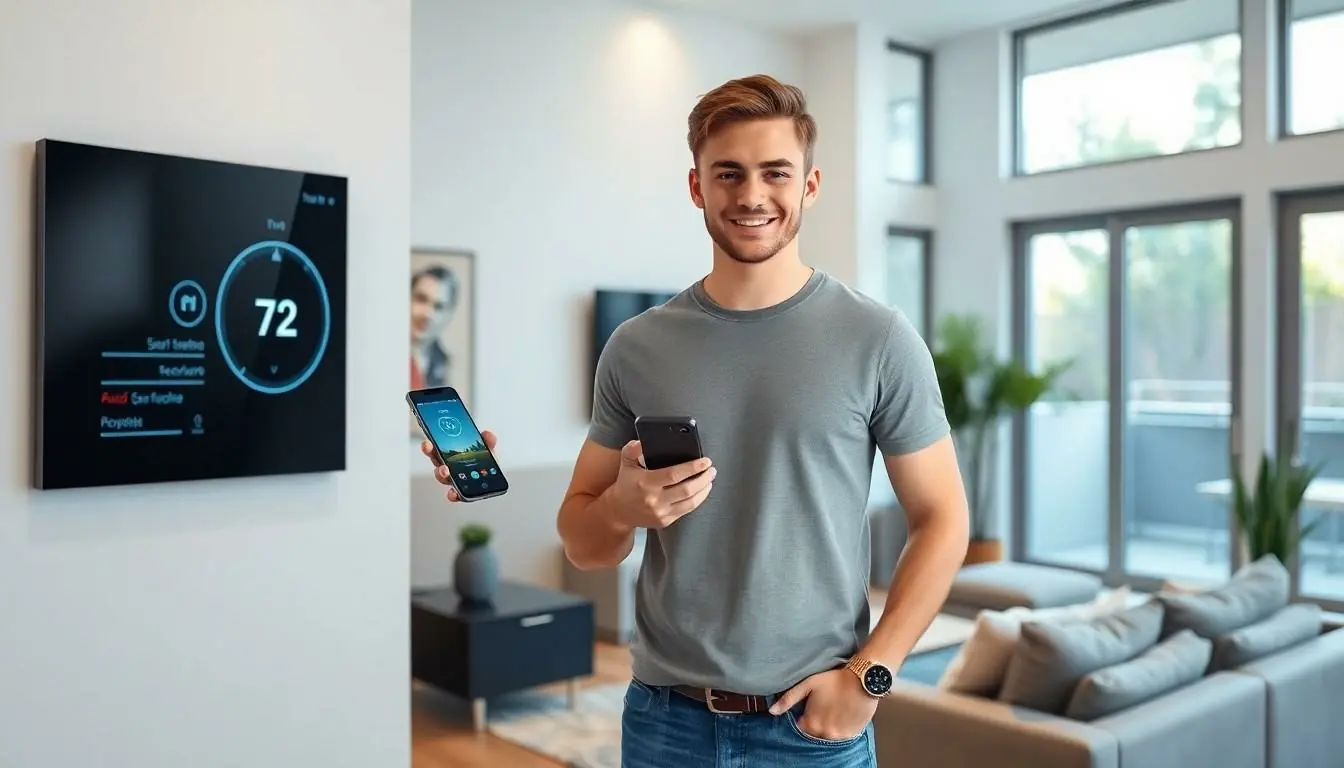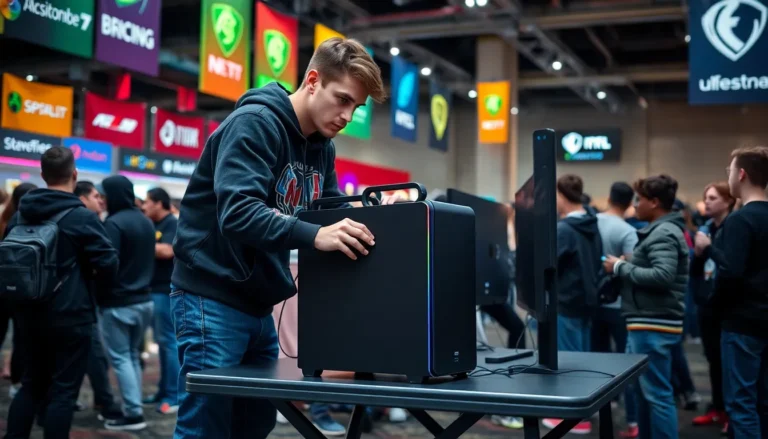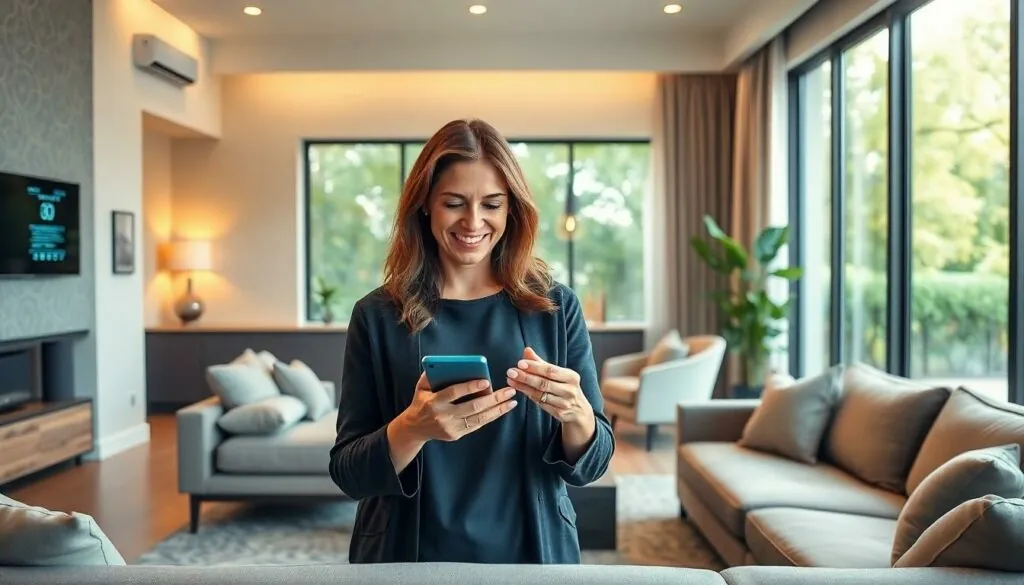Table of Contents
ToggleImagine coming home after a long day, and your house greets you like a loyal puppy. Custom smart homes are revolutionizing the way people live, turning everyday spaces into high-tech havens. With a few taps on a smartphone or a simple voice command, lights adjust, temperatures change, and even your coffee brews itself. It’s like living in the future, minus the flying cars—at least for now.
But it’s not just about convenience; it’s about creating a home that reflects individual tastes and lifestyles. From automated security systems to mood-enhancing lighting, custom smart homes offer a tailored experience that makes life easier and more enjoyable. So why settle for a cookie-cutter space when technology can help craft a home that’s uniquely yours? Dive into the world of custom smart homes and discover how to turn your living space into a personal paradise.
Overview of Custom Smart Homes
Custom smart homes represent a significant shift in how individuals interact with their living spaces. Homeowners utilize advanced technology to tailor environments that meet their specific needs and preferences. Automation plays a crucial role in enhancing comfort and efficiency. Systems like heating, lighting, and security can all be adjusted remotely, providing convenience at one’s fingertips.
Enhanced energy management is another key benefit. Smart devices allow for real-time monitoring and regulation of energy consumption, leading to potential savings on utility bills. Features such as programmable thermostats and energy-efficient lighting adapt based on occupancy and preferences. These elements create a more eco-friendly lifestyle.
Personalization options extend beyond simple automation. Color schemes and styles reflect individual tastes while accommodating changing moods and occasions. Homeowners may integrate smart speakers to set the ambiance with music or control visual settings through voice commands. Customized installations elevate living experiences, making spaces more enjoyable and functional.
Security remains a top priority for many. Custom smart homes include surveillance cameras, motion detectors, and smart locks. These features provide peace of mind while allowing homeowners to monitor their properties from anywhere. Integration with mobile devices simplifies security management and alerts users about potential threats instantly.
The flexibility of custom smart homes supports various lifestyle choices. From families to remote workers, these homes adapt to diverse needs and routines. Each home is a unique expression of its owners, blending modern technology with personal preferences for a fully immersive living environment.
Benefits of Custom Smart Homes

Custom smart homes offer numerous advantages that enhance everyday living through technology. Homeowners enjoy convenience, energy efficiency, and improved security, transforming their spaces into personalized environments.
Enhanced Convenience
Instant control of home functionalities marks a significant benefit. Residents adjust lighting, temperature, and security systems remotely using smartphones or voice commands. Automated systems streamline daily tasks, like scheduling appliances and managing entertainment setups. Customization options cater to individual preferences, allowing personal schedules and routines to dictate home behavior. Smart homes also enable seamless integration of devices, opening opportunities for more efficient interactions within the space.
Energy Efficiency
Energy savings are a notable advantage of custom smart homes. Smart thermostats optimize heating and cooling based on real-time data, ensuring minimal waste. Homeowners track energy usage through user-friendly dashboards, identifying patterns and areas for improvement. Automated lighting systems adjust based on natural light availability, reducing electricity consumption. With these technologies in place, families can expect lower utility bills and a more sustainable lifestyle.
Improved Security
Advanced security features greatly enhance safety in smart homes. Smart locks enable remote access control, allowing homeowners to grant entry to visitors without being present. Surveillance cameras provide real-time alerts and video feeds, ensuring peace of mind. Integration of motion sensors adds another layer of protection against intruders. Homeowners can monitor their properties via mobile devices, facilitating quick responses to any unusual activities. This comprehensive approach makes security a top priority in modern living environments.
Key Components of Custom Smart Homes
Custom smart homes rely on a range of sophisticated technologies that enhance functionality and comfort. Key components include advanced smart devices and seamless home automation integration.
Smart Devices and Systems
Smart devices form the backbone of a custom smart home. Thermostats, security cameras, smart locks, and lighting systems contribute to an interconnected environment. Homeowners remotely control these systems through smartphones or voice assistants, enabling easy management of daily activities. Energy-efficient appliances, such as smart refrigerators and washing machines, operate in harmony with these devices to optimize energy use. Sensors monitor activity and adjust settings automatically, enhancing convenience and security for families and individuals.
Home Automation Integration
Home automation integration brings various smart devices together, creating a cohesive living experience. Central hubs act as controllers, allowing seamless communication among devices. Homeowners customize settings to suit their lifestyles, establishing routines for lighting, temperature, and security. For example, automated schedules can prepare the home for specific activities, adapting environments based on time of day or occupancy. This integration fosters significant energy savings and enhances security, as alarms and cameras link with user-defined preferences. Customization options make each home not only functional but also uniquely tailored to its inhabitants.
Challenges in Creating Custom Smart Homes
Creating custom smart homes involves navigating several challenges. These obstacles can affect the planning and implementation process for homeowners.
Cost Considerations
Costs can quickly escalate when designing custom smart homes. Budgeting for advanced technology requires careful planning and realistic expectations. Expenses often include smart devices, installation services, and ongoing maintenance. Homeowners must account for hidden fees like subscription services for enhanced features. Prioritizing key functionalities helps to allocate funds efficiently. Savings may arise from energy-efficient enhancements, but initial investments may still be significant. Many users find it beneficial to research available options before making high-cost decisions.
Technical Expertise
Technical expertise plays a crucial role in the successful implementation of custom smart homes. Homeowners may lack the necessary skills to install or integrate smart devices effectively. Expertise is required for tasks such as configuring network settings or ensuring device compatibility. Many homeowners benefit from hiring professionals to tackle complex installations. Lack of understanding may lead to connectivity issues or inefficient use of devices. Familiarizing oneself with the technology aids in making informed decisions. Seeking assistance from knowledgeable friends or professionals eases the process and enhances the overall smart home experience.
Future Trends in Custom Smart Homes
Artificial intelligence will play a significant role in enhancing smart home technology. Homeowners can expect intelligent systems that learn and adapt to individual preferences over time. Increased integration of Internet of Things devices will facilitate seamless communication, connecting multiple appliances and services.
A focus on sustainability emerges as another trend in custom smart homes. Many homeowners prioritize eco-friendly solutions, leading to the rise of energy-efficient appliances and renewable energy sources. Smart homes incorporating solar panels significantly lower utility costs while promoting environmental responsibility.
Voice-activated technology continues to dominate the landscape. Integrating voice assistants like Amazon Alexa or Google Assistant allows for effortless control of home functions through simple commands. This convenience stands out as essential for modern homeowners seeking smart solutions.
Personalization options will expand, enabling tailored experiences based on lifestyle needs. Flexible designs allow users to modify layouts, lighting, and color schemes quickly. Customization promotes comfort, ensuring spaces reflect individual styles.
Cybersecurity investments are becoming critical as smart devices proliferate. Homeowners increasingly secure their networks to prevent unauthorized access to data and systems. Surveillance technologies and advanced encryption methods will enhance safety and user confidence.
Home automation systems will evolve, emphasizing user-friendly interfaces. Simplified controls attract a broader audience, including those less tech-savvy. Intuitive applications will encourage widespread adoption, ensuring that smart homes are accessible to everyone.
Emerging technologies like augmented reality may reshape how homeowners visualize customizations. Users can preview changes and modifications by using AR applications. This immersive experience facilitates informed decision-making during the design process.
Custom smart homes redefine modern living by merging technology with personal preferences. They offer homeowners unparalleled control over their environment while enhancing comfort and security. As technology continues to evolve, these homes will become even more intuitive and accessible.
Embracing the possibilities of custom smart homes can lead to a tailored living experience that not only reflects individual tastes but also promotes energy efficiency and safety. While challenges such as costs and technical expertise exist, the long-term benefits far outweigh the initial hurdles.
With a focus on personalization and emerging trends, the future of smart homes promises exciting advancements that will further enrich daily life. Homeowners are encouraged to explore these innovations and create a space that truly feels like home.







